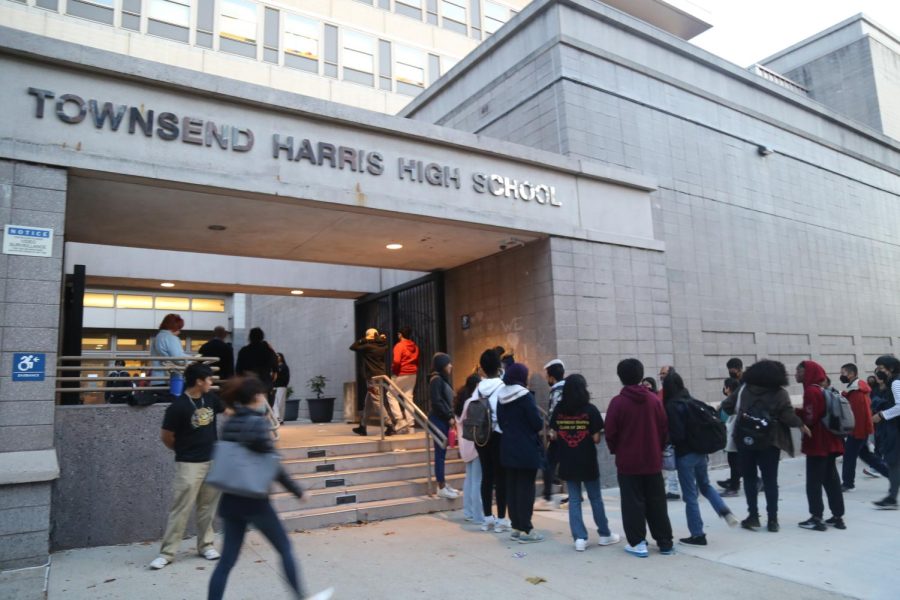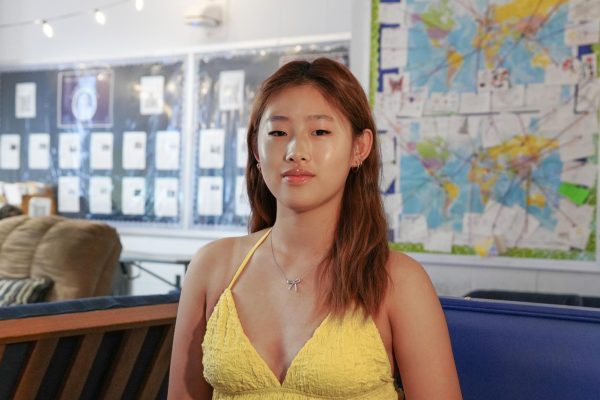
“I feel inferior and a sense of alienation,” a current junior told The Classic at the end of last term. She said she is looked down upon by students from other classes, including other juniors.
The juniors, also known as the class of 2026, were admitted through a different admissions process than most previous years, one relying primarily on a lottery component.
Until 2020, Townsend Harris High School’s admissions criteria were more strict: eighth graders needed a minimum overall average of 90%, a high standardized math and reading score, and excellent attendance. However, THHS changed their admissions process in 2021, when the pandemic made it more difficult to assess these previously common components of admissions. For current seniors, the class of 2025, THHS first used a lottery-based system, which included report card grades and sixth grade standardized test scores. For juniors, the lottery system relied on report card grades. Students with average grades of between 85-100 were grouped together as part of the top ranked bracket. Students with those grades were then chosen at random, with 50% of the spots reserved for free and reduced lunch students, using criteria set by the DOE.
By 2023, the school had more flexibility to create additional criteria (including writing and video samples).
Since THHS changed its criteria, members of the class of 2026 have reported to The Classic that they have been referred to by both adults and fellow students from other grades disparagingly as “the lottery kids.”
Junior Ella Nam said, “Last year when the [current sophomores] were accepted into Townsend, I remember one of them posting on their story about how [students in our grade] are more stupid than they are.”
Junior Bianca Chen said, “The junior year being labeled as the lottery kids, makes us seem like the lesser body of the THHS community, as our admission process was viewed as easier than the other grades, and as ‘unfair.’”
Students from other grades and teachers said they are aware of this nickname, though those who spoke to The Classic said they do not approve of it.
Sophomore Morgan Laminta said, “The term ‘lottery kids’ sounds more like a negative connotation than positive, so it makes me feel bad for the juniors. It sort of belittles their hard work.” Senior Allison Mejia said, “I don’t believe juniors are specifically different from others, as they are equally capable and have as much potential as anyone else.”
Interim Acting Assistant Principal of Science, Technology, Engineering and Mathematics, and teacher Abid Choudhury, who teaches algebra II and AP pre-calc to sophomores and juniors, said he gets worked up when he hears people calling his students “lottery kids.”
“I hate the nickname and I want it to die,” he said, “If you’re a Townsend student, you’re a member of the school community. I hate the arbitrary social stratification the nickname creates. Language carries weight,” Mr. Choudhury said.
Shaw Williams, a junior who was last year’s class of 2026 class president said, “When me and some of my peers hear the term ‘Lottery Kids’ being used against us, it can be extremely demotivating, as we work so hard to contribute to the school community, and such labels can undermine our efforts and achievements.”Adding on, Junior and Student Union Senate Chair Natalie Tamma said, “In terms of us being considered the “lottery kids”, I don’t see it like that. In my eyes, we are upholding the diversity aspect of this school, as kids of every background, such as cultural and academic, have the ability to learn here. Other grades might not be as diverse as ours, but that doesn’t diminish our abilities as a class.”
Lastly, Student Union Junior Class President Jenna Abdelhamid wants to move on from the past regarding this admission process of lottery. She said, “Dwelling on the past only stunts the future potential success of this class, and I hope that as class president, I will be able to establish an image that reflects how bright, creative, athletic, and talented the class of 2026 truly is.”
Dean and social studies teacher, Ian Morzan said, “I think the way in which they were selected is drastically different than the way the other grades were selected,” and that on its own leads to assumptions about juniors being different than other grades. However, he adds, “The juniors are just as talented and just as intelligent and just as capable as other groups of students. I think the juniors also had a unique position as far as when they were impacted by the pandemic.”
Orchestra teacher Christopher Lee said, “As far as I know, the student selection process for Townsend Harris has never been purely based on merits, and the admission standards for the class of 2026 can only be described as ‘more arbitrary’ than previous years.”
The prevalence of the term – all people who were interviewed for this article had heard the term and were aware of its widespread usage – suggests that, for at least one class, the isolating factors of the pandemic are still present and still impacting the social experience of students years after the period of remote learning ended.
According to Shaw, the use of the term is evidence that more work needs to be done to include the class of 2026 fully in the school community.




























